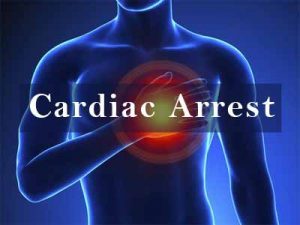- Home
- Editorial
- News
- Practice Guidelines
- Anesthesiology Guidelines
- Cancer Guidelines
- Cardiac Sciences Guidelines
- Critical Care Guidelines
- Dentistry Guidelines
- Dermatology Guidelines
- Diabetes and Endo Guidelines
- Diagnostics Guidelines
- ENT Guidelines
- Featured Practice Guidelines
- Gastroenterology Guidelines
- Geriatrics Guidelines
- Medicine Guidelines
- Nephrology Guidelines
- Neurosciences Guidelines
- Obs and Gynae Guidelines
- Ophthalmology Guidelines
- Orthopaedics Guidelines
- Paediatrics Guidelines
- Psychiatry Guidelines
- Pulmonology Guidelines
- Radiology Guidelines
- Surgery Guidelines
- Urology Guidelines
Timely Intervention saves the life of a 22 year-old who suffered a sudden cardiac arrest

Unhealthy lifestyles, tobacco use and unregulated use of energy supplements leading to cardiovascular diseases among youth
Doctors from Fortis Hospital, Shalimar Bagh successfully treated a 22-year-old male patient who suffered from a heart attack. The patient, admitted with complaints of intense chest pain, was profusely sweating and was out of breathing. A team of doctors led by Dr Pramod Kumar, Director and Head, Department of Cardiology, Fortis Hospital Shalimar Bagh treated him.
Rahul Jain (name changed), 22 years of age, presented to the hospital with complaints of acute chest pain, muscle stiffness and intense sweating. An Electrocardiography (ECG) was done which indicated that he was having a heart attack. This diagnosis was confirmed after a special blood test (tropin) tested positive for the same. The patient was immediately given strong blood thinning agents. An angiogram was conducted, revealing a clot in one of the major arteries.
Since blood thinners had been given to the patient, his blood flow was almost normal. As a result, an angioplasty was not required and his condition was managed medically. The medical management of such heart conditions comprises of drugs and significant lifestyle changes. In this case, the patient was advised to quit smoking and change his dietary habits. The youth mainly suffers from heart ailments due to smoking and high quantities of stress (physical or emotional) - which lead to the complete occlusion of the coronary artery and ultimately a heart attack.
Patient shares, “I have been smoking for several years. I had recently began taking energy supplements (after a gap of 4 months) and carrying heavy weights (in the gym). After going to the gym, I would often experience muscle pain – but I never thought it was indicative of a heart problem. Recently, I completed my exercise and started to feel uneasy. I could feel severe pain in my chest. I was also sweating intensely and could feel my muscles stiffen. After this incident I have realized the importance of maintaining good heart health.”
Dr. Paramod Kumar, Director and HOD, Department of Cardiology, Fortis Hospital, Shalimar Bagh said, “Smoking damages the lining of the blood vessels and causes an increase of fatty deposits in the arteries which eventually leads to blood clotting. Consuming health and energy supplements along with sudden physical exertion may also have an adverse effect on the heart. There has been an alarming increase in the number of young patients suffering from heart attacks. 45 percent of deaths are caused by heart diseases in our country. Recent reports have suggested that the substantial number of heart patients in India are less than the age of 40. “
Mr. Mahipal Bhanot, Facility Director, Fortis Hospital, Shalimar Bagh, “We have seen a significant increase in the number of young patients being treated for heart attacks. In the month of September itself, Fortis Shalimar Bagh treated three patients who were below the age of 33. Timely diagnosis and treatment is of acute importance. Fortis Hospital Shalimar Bagh is equipped to handle all cardiology related ailments in a time-bound and efficient manner.”
Heart ailments can be combatted by engaging in 30 minutes of activity a day. If one stops smoking, the risk for coronary heart disease is reduced to half. Keeping a healthy weight and limiting salt intake helps control blood pressure. Blood pressure, cholesterol and glucose levels should be checked regularly and maintained within normal range, as these are the biggest indicators of heart disease.

Disclaimer: This site is primarily intended for healthcare professionals. Any content/information on this website does not replace the advice of medical and/or health professionals and should not be construed as medical/diagnostic advice/endorsement or prescription. Use of this site is subject to our terms of use, privacy policy, advertisement policy. © 2020 Minerva Medical Treatment Pvt Ltd